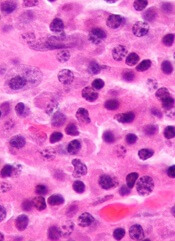
Murine studies have revealed signaling molecules that appear to play crucial roles in plasma cell development and survival.
Investigators found the adaptor protein DOK3 promotes the differentiation of plasma cells, and the protein-tyrosine phosphatase SHP1 enables plasma cell migration.
The team said these discoveries advance our understanding of plasma cells and may help us improve treatment for multiple myeloma and autoimmune disorders.
In PNAS, Kong-Peng Lam, PhD, of the Bioprocessing Technology Institute in Singapore, and his colleagues reported their discovery that DOK3 plays an important role in the formation of plasma cells.
The team found that calcium signaling inhibits the expression of PDL1 and PDL2, membrane proteins that are essential for plasma cell formation.
But DOK3 can promote the production of plasma cells by reducing the effects of calcium signaling on these proteins. And conversely, the absence of DOK3 results in defective plasma cell formation.
In Nature Communications, Dr Lam and his colleagues reported their discovery that SHP1 signaling is important for the long-term survival of plasma cells.
The researchers found that, in the absence of SHP1, plasma cells fail to migrate from the spleen to the bone marrow. This can impair the body’s immune response and increase susceptibility to infections and diseases.
However, Dr Lam and his colleagues were able to rectify the defective immune response caused by SHP1 deletion with antibody injections, a result that might aid the development of therapeutics for autoimmune disorders.
On the other hand, targeting SHP1 might be a strategy to treat multiple myeloma, in which the accumulation of cancerous plasma cells in the bone marrow is undesirable.
“These findings allow better understanding of plasma cells and their role in the immune system,” Dr Lam said. “The identification of these targets not only paves the way for development of therapeutics for those with autoimmune diseases and multiple myeloma but also impacts the development of immunological agents for combating infections.”

